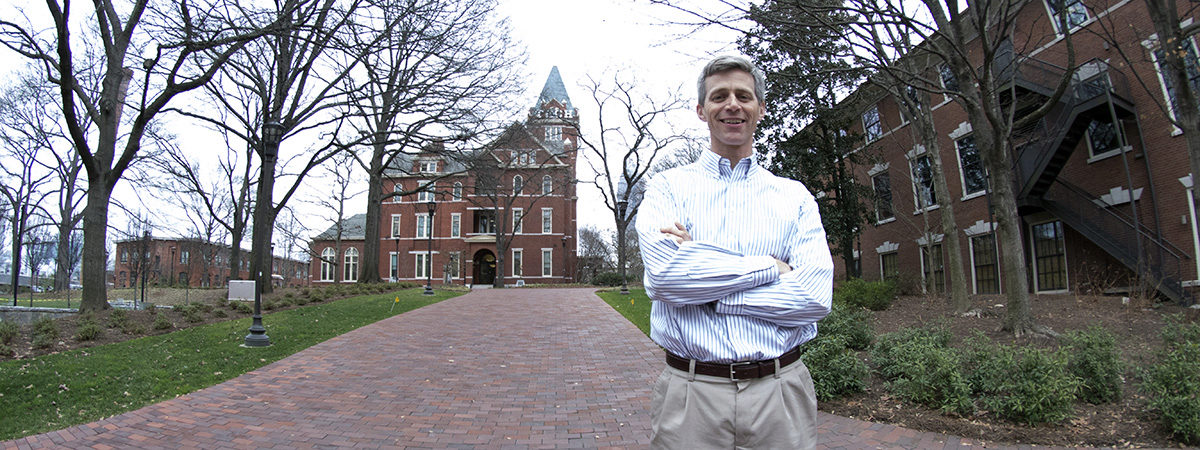
There’s something about Tim Lieuwen’s 1995 grad school interview at Georgia Tech that seems to have foreshadowed his 2018 election to the National Academy of Engineering. Call it energy. A rabid intellect. Or just plain persistence. Whatever the quality, it still makes Lieuwen’s doctoral advisor, Regents Professor Ben T. Zinn, laugh.
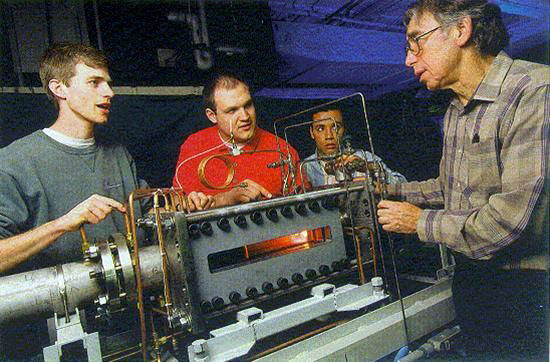 |
| As a graduate student Tim Lieuwen, far left, was fond of questioning his mentor, Regents Professor Ben T. Zinn, right. That did not change when Lieuwen joined the AE faculty in 1999. |
“There must have been 12 students in that interview. I probably forgot most of them by the next week. Not Tim Lieuwen. He kept asking questions,” recalls Zinn, a NAE member and icon in his own right.
“Even after he left campus I kept getting emails from him, asking if he could work with me. I wasn’t so sure. Where was he from? What had he done? He was a bit of an unknown. But when he arrived on campus that fall, I could tell within a week that he was someone special because he was asking questions I didn’t know the answers to. And that told me he was really thinking.”
Fast-forward 23 years and AE School Chair Vigor Yang (also a NAE member) is hard-pressed to come up with a better description of Lieuwen, who now holds the David Lewis S. Chair in the propulsion and combustion group.
“Tim Lieuwen really is that colleague who asks great questions and listens for the answers that will drive the field forward. And then he does the work to move us all forward – students, colleagues, sponsors. In everything he does, he has made the AE School proud.”
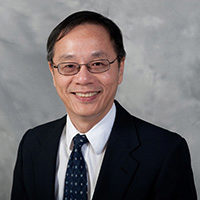 |
| AE Chair Vigor Yang |
For all the praise, Lieuwen remains remarkably similar to that humble undergraduate who innocently peppered Zinn with questions decades ago. What’s changed, of course, is the bounty those questions have produced.
A world-renowned expert in the area of combustion and energy, Lieuwen has authored or edited four combustion books, seven book chapters, 120 journal articles, and more than 200 other publications. He has been awarded four patents (all licensed to industry) and named a Fellow of ASME and AIAA. He is a member of numerous professional societies and serves as an editor for several technical publications. He is also the director of Georgia Tech’s Strategic Energy Institute, acting as a systems integrator for the 200 faculty and 800 energy researchers on campus.
With such a towering list of accomplishments on his resume, many thought his election to the NAE was just a matter of time. Lieuwen was never one of them.
“I still cannot quite believe this,” he said the day of the announcement. “But the thing is, it’s not about Tim Lieuwen.”
“The way to look at it is: It’s recognition for the impact we’ve had on clean energy, designing combustors that will burn more efficiently, mitigating the problems at the design stage. And it’s really recognition for my research group, the School of Aerospace, and Georgia Tech – the culture here, the great researchers, and mentors who have made my work possible.”
If you hear humility in his voice, you are on to something. For this husband and father of four, the accolades that have lately been laid upon him are not the point.
“I really love what I get to do,” he says. “This is really a lot of fun.”
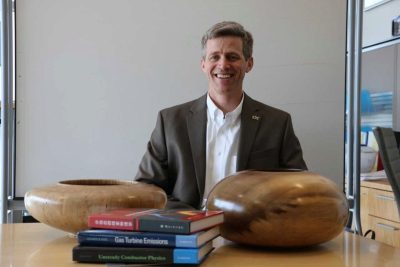 |
| "On Sunday afternoon, when I want to relax I go to my wood shop at home." Lieuwen is seen here with two of the many artistic creations he has sculpted - a hobby that he claims keeps him grounded. In the foreground: some of the textbooks Lieuwen has authored when he's not relaxing. |
Born and raised outside of Cincinnati, Tim Lieuwen never planned to become an academic, a researcher, or a thought leader.
“I loved working with my hands, so my original plan was to own and work in a machine shop, where I could design stuff with lathes and mills. My Dad was a mechanical genius, so I spent a good deal of my childhood laying under cars or tractors, working on engines with him. I actually had a small engine repair shop when I was in high school – fixed things for neighbors. I even had business cards.”
The same passion that possessed him in the machine shop welled up again, in college, when he discovered the power of research.
Georgia Tech professor William Wepfer, then the chair of Graduate Studies, remembers recruiting that top notch student from a little-known school (Calvin College) because he had such obvious commitment to higher-level learning. Wepfer was not disappointed when Lieuwen flew in for the interview.
"Tim walked in - tall string bean of a guy, with a great big smile - and he said 'Dr. Wepfer I would love to come to Georgia Tech, study with Ben Zinn, and get my Ph.D. in three years,'" says Wepfer, now the chair of the George W. Woodruff School of Mechanical Engineering. "Such a great combination of innocence and confidence -- and very smart. I think he did finish his Ph.D. in three-and-a-half years - which is saying something because Zinn was not easy."
Lieuwen agrees: Zinn was not easy. But the more he was challenged, the more Lieuwen liked where he'd landed.
“I came to Tech to get my masters, thinking I’d go into industry, to work on engine design. But what I realized was that improving engines would require a higher level of training and knowledge. That became interesting to me. I thought it was cool that you could write symbols on a piece of paper and predict what would happen with an engine. I was attracted by the practical piece – not just working on a problem for intellectual stimulation. I loved the fundamental problems that pointed toward solving real-world problems.”
That fascination followed him into his doctoral work, where, under Zinn’s tutelage, he began to see research as a creative endeavor.
“A lot of times people think of research as dry, dorky mechanical stuff, but, if you really consider it, research is a thing of beauty and creativity. It gives you a chance to see the symmetry of how the world is put together,” he said. “It’s a creative endeavor, really, because we are creating knowledge and developing insight.”
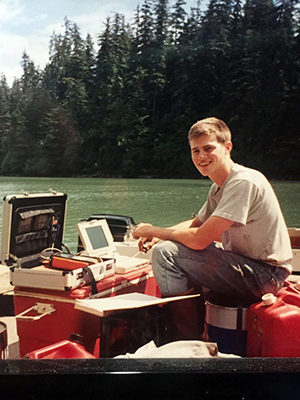 |
| One of the best jobs a young Tim Lieuwen ever got was working for the US Forest Service in Alaska. He is seen here collecting GPS data in a boat in Wrangell, Alaska. |
Lieuwen describes his longtime research in combustion as being intense and very interesting, but narrow. It afforded him ample opportunity to dive deep into the science of combustion, but it didn’t contemplate the full impact of that work.
That changed five years ago when he was appointed director of Georgia Tech’s Stratgic Energy Institute (SEI).
“My work at SEI allowed me to look at things from a global perspective, to fully deploy and integrate the resources of Georgia Tech to tackle global energy and environmental challenges,” he said. “I’ve enjoyed working on large-scale federal efforts. It’s been really interesting to tackle the policy side of energy. For instance, how do we as a country move the needle on climate change without also putting vulnerable people out of jobs? That’s a very important question. And the most important thing we can do, as scientists, is to be honest brokers of information, not advocates.”
This even-handed assessment of a wide-ranging engineering problem does not surprise Lieuwen’s longtime AE colleague, Dr. Robert Braun, now the dean of Engineering and Applied Sciences at the University of Colorado, Boulder.
“He’s always been incredibly smart, well organized, and thoroughly engaged in whatever problem is before him,” said Braun, also an NAE member. “He’s a systems thinker – always able to cut down big challenges into smaller pieces for clear-headed investigation and deliberation. And no matter what problem he was tackling, he always had that huge smile on his face, which actually made the work fun for the rest of us.”
Lieuwen is quick to acknowledge his colleagues’ generous praise with that hallmark smile of his, but he does not linger in the moment. Yes, it’s been a great ride to this point, but…
“90 percent of the world’s energy comes from some form of combustion. The work we’ve done has had some impact on lowering emissions, and making the process more efficient, but much more needs to be done. We have to dig deeper.”
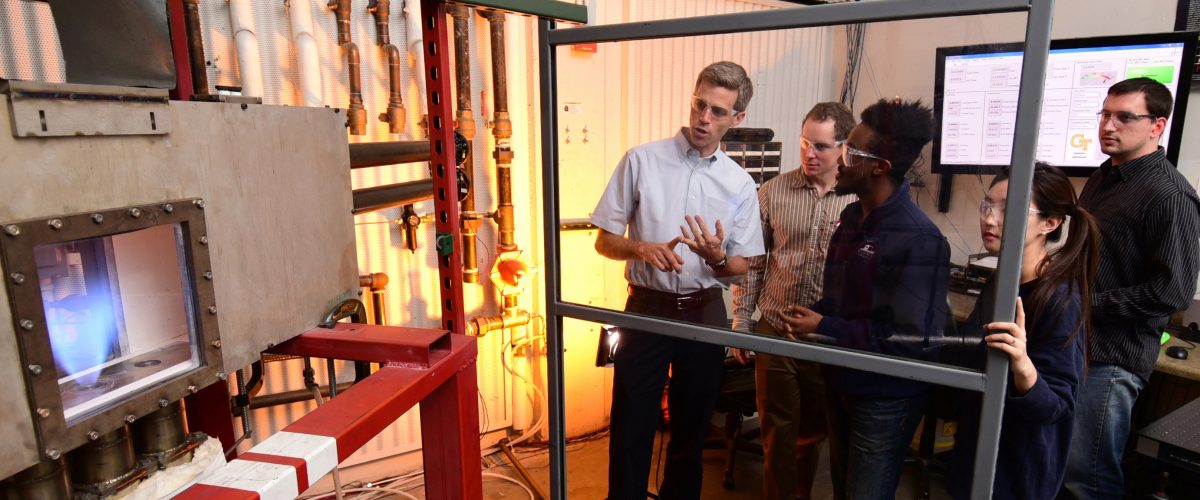
As seriously as he takes his research, Lieuwen's website greets visitors with a somewhat humorous mission statement: "If you like making fire, making noise, and saving planet all at the same time, these are all great problems to work on!" No one who has ever worked with Tim Lieuwen would mistake this whimsy for anything less than his unique passion for combustion research.